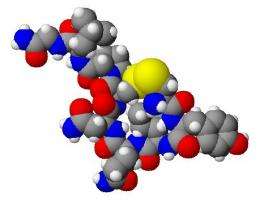January 12, 2011 report
Research finds the hormone of trust has limits

(PhysOrg.com) -- Oxytocin is a hormone produced by the hypothalamus in the brain, and has been shown to make people trust each other more and promote feelings of love. But this hormone has now been found to have limits, since it promotes love and trust only towards people of the same "in-group" and not towards people who are seen as different. Psychologists have therefore concluded it is involved in ethnocentrism.
Ethnocentrism is the tendency of people to see their own group as superior to other groups, which can lead to prejudice, intergroup violence, and xenophobia.
Psychologist Carsten K. W. De Dreu of the University of Amsterdam and colleagues postulated that the brain hormone oxytocin could modulate ethnocentrism. They also speculated that if oxytocin caused people to place unbounded trust in other people they would not survive, and this implies the effects of oxytocin must be limited.
Dr. De Dreu and colleagues carried out experiments last year in which they demonstrated that oxytocin made people more generous towards their own “in-group” at the expense of an “out-group,” and they have now followed up with new double-blind experiments using Dutch male university students as the in-group and Arabic and German males as out-groups. Arabs were chosen because a 2005 survey showed a small majority of Dutch people saw them unfavorably, and Germans were chosen because they were reportedly seen by many as arrogant, cold, and aggressive.
One of the experiments measured the time the 280 students took to press a key when they were shown a pair of words. One of the words was either a common in-group Dutch first name such as Robbert or Peter or an out-group name such as Helmut or Youssef. The other word had either a positive or negative connotation. The idea was that if the words have similar emotional values, the student would press the key more quickly, while they will take longer if the words produce conflicting emotional responses. Students were given a dose of oxytocin or a placebo via a nasal spray 40 minutes before the test.
Another experiment presented the students with standard moral dilemmas in which the subject is asked to weigh the lives of a group of people against that of a single individual. One example had the subjects choose whether or not to save five people from being hit by a train by diverting the train into the path of a single person. The five people potentially saved had no names, but the lone person was given either an in-group Dutch name or out-group Arab or German name.
The research showed a trend for people influenced by oxytocin to show more favoritism to their own group, but they rarely showed increased negative feelings to others. The results of the moral dilemma test, for example, showed those who took oxytocin were far less likely to sacrifice a lone person with an in-group name, while the name had no effect for those sniffing the placebo.
The researchers concluded the effects of oxytocin were to promote in-group favoritism, and to enhance negative feelings towards the out-group, but only to a much lesser extent. This finding is counter to the widespread view of oxytocin as a “love drug” or “cuddle chemical,” and suggests the hormone also has a role in violence and conflict between different groups.
In future research, Dr. De Dreu and colleagues plan to investigate any links between oxytocin and social behaviors that may have evolutionary significance, such as cooperation, penalizing deviation from accepted behaviors, and behaviors associated with religious experience. Dr. De Dreu expects oxytocin will be found to have no more effect on religious experience than other behaviors such as soccer hooliganism, and said that when people join with others who share their values, this “drives up the level of oxytocin.”
The paper was published in the Proceedings of the National Academy of Sciences (PNAS) in the US.
More information: Oxytocin promotes human ethnocentrism, Carsten K. W. De Dreu, Lindred L. Greer, Gerben A. Van Kleef, Shaul Shalvi, and Michel J. J. Handgraaf, Proceedings of the National Academy of Sciences, Published online before print January 10, 2011, doi:10.1073/pnas.1015316108
© 2010 PhysOrg.com















